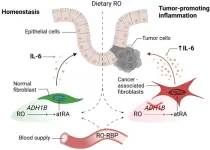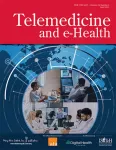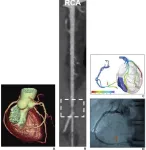(Press-News.org) LA JOLLA, CALIF. – May 03, 2023 – When the cells of our immune system are under constant stress due to cancer or other chronic diseases, the T cells of the immune system shut down in a process called T cell exhaustion. Without active T cells, which kill tumor cells, it’s impossible for our bodies to fight back against cancer. One of the biggest goals of immunotherapy is to reverse T cell exhaustion to boost the immune system’s ability to destroy cancerous cells.
Researchers at Sanford Burnham Prebys studying melanoma have found a new way to make this happen. Their approach, described in Cell Reports, can reduce T cell exhaustion even in tumors that are resistant to clinically approved immunotherapies. It can also help T cells from becoming exhausted.
“Slowing or reversing T cell exhaustion is a huge focus in cancer research, and many researchers are working on different ways to accomplish this,” says first author Jennifer Hope, Ph.D., who completed this research as a postdoctoral researcher at Sanford Burnham Prebys and is now an assistant professor at Drexel University. “This new approach could be a viable treatment on its own, but it also has tremendous potential to work synergistically with existing therapies.”
Although there are established immunotherapies that target T cell exhaustion, the new approach is unique in that it targets several different aspects of the process at once. This means that it could help people overcome resistance to various anti-cancer immunotherapies that are currently available.
“One of the foundational ideas of modern cancer treatment is not relying on a single therapy, since this can cause the cancer to become resistant to that treatment,” says senior author Linda Bradley, Ph.D., a professor in the Cancer Metabolism and Microenvironment Program at Sanford Burnham Prebys. “The more tools at our disposal to slow down or reverse T cell exhaustion in different ways, the better chance we have of improving precision medicine and helping more people with cancer benefit from immunotherapy.”
Their approach hinges on a protein called PSGL-1, which is found in most blood cells. By studying mice with a genetic deficiency in PSGL-1, the researchers determined that this protein helps facilitate T cell exhaustion, a major roadblock to effective anti-cancer immunity.
The researchers then used an antibody to block the activity of PGSL-1 in mice with immunotherapy-resistant melanoma. They found that targeting PSGL-1 slowed the process of T cell exhaustion and helped exhausted T cells switch back into functioning T cells. These two effects significantly reduced tumor growth in the mice.
“One of the things that makes this approach unique compared to existing immunotherapies is that it directly alters the way T cells become exhausted and helps them regain their function,” says Hope. “I think this is going to be crucial in terms of its translational potential.”
The researchers were also able to replicate this effect in mice with mesothelioma, suggesting that the approach could be applicable to a wide range of cancers. Although the treatment they used in this study is not yet suited for clinical use in humans, the overall approach of using antibodies or recombinant proteins for immunotherapy is well established. This means that translating these results for people with cancer may just be a matter of time and testing.
“Once we’ve done all the necessary science, this could be really valuable, or even lifesaving, for a lot of people with cancers that are resistant to current treatments,” says Bradley. “We still have a long way to go, but I’m optimistic that we’re onto something game-changing here.”
###
Additional authors on the study include Dennis C. Otero, Eun-Ah Bae, Christopher J. Stairiker, Ashley B. Palete, Hannah A. Faso, Michelle Lin, Monique L., Henriquez, Sreeja Roy, Xue Lei, Eric S. Wang, Savio Chow, Roberto Tinoco, Kevin Yip, Alexandre Rosa Campos, Jun Yin, Peter D. Adams and Linda M. Bradley, Sanford Burnham Prebys; Anjana Rao and Hyungseok Seo, La Jolla Institute for Immunology; and Gregory A. Daniels, Moores Cancer Center at UC San Diego Health.
The study was supported by grants from the American Cancer Society (PF-20-113-01-LIB), the National Institutes of Health (T32 AI125209, R01 AI106895, R21 CA249353, R21 CA216678, R03 CA252144, R01 AI040127, R01 AI109842, P30 CA030199), the Melanoma Research Alliance (MRA 696326), the Department of Defense (W81XWH-20-1-0324), the American Association of Immunologists, the San Diego Cancer Centers Council (C3 2018), the Association of Immunologists Careers in Immunology Fellowship Program, and was supported in part by the following Sanford Burnham Prebys Core facilities: Flow Cytometry, Vivarium, Histology, Bioinformatics, Proteomics, and Cancer Metabolism.
The study’s DOI is 10.1016/j.celrep.2023.112436
About Sanford Burnham Prebys
Sanford Burnham Prebys is an independent biomedical research institute dedicated to understanding human biology and disease and advancing scientific discoveries to profoundly impact human health. For more than 45 years, our research has produced breakthroughs in cancer, neuroscience, immunology and children’s diseases, and is anchored by our NCI-designated Cancer Center and advanced drug discovery capabilities. For more information, visit us at SBPdiscovery.org or on Facebook facebook.com/SBPdiscovery and on Twitter @SBPdiscovery.
END
Reviving exhausted T cells to tackle immunotherapy-resistant cancers
A new approach to immunotherapy could help overcome treatment resistance in cancer
2023-05-04
ELSE PRESS RELEASES FROM THIS DATE:
MD Anderson researchers Helen Piwnica-Worms and Richard Wood elected to National Academy of Sciences
2023-05-03
HOUSTON ― Two researchers from The University of Texas MD Anderson Cancer Center have been elected to the prestigious National Academy of Sciences (NAS). Helen Piwnica-Worms, Ph.D., professor of Experimental Radiation Oncology, and Richard Wood, Ph.D., professor of Epigenetics and Molecular Carcinogenesis, are recognized for their respective contributions to advancing our understanding of cancer genetics, biochemistry and cell biology.
Piwnica-Worms and Wood are among 120 new members ...
Purdue startup Aerovy Mobility develops cloud software to support infrastructure for electric aircraft
2023-05-03
WEST LAFAYETTE, Ind. – The advanced air mobility sector, which includes electric-powered urban and regional aircraft, may become a $1.5 trillion market by 2040. A new Purdue University-connected startup could benefit airport and vertiport operators and real estate developers looking to establish advanced air mobility technology at existing and potential sites.
Purdue University postgraduate students have launched Aerovy Mobility, a startup company that commercializes cloud-based software solutions to plan and operate infrastructure ...
Retinol disruption and the role of vitamin a metabolism in colon cancer
2023-05-03
“Retinoids are known to inhibit tumor-promoting IL-6 production.”
BUFFALO, NY- May 3, 2023 – A new research perspective was published in Oncotarget's Volume 14 on April 26, 2023, entitled, “Disruption of retinol-mediated IL-6 expression in colon cancer-associated fibroblasts: new perspectives on the role of vitamin A metabolism.”
Colon cancer (CRC) is one of the most common malignancies and is a leading cause of cancer-related deaths worldwide. While the tumor microenvironment (TME) supports tumor growth and immune escape through tumor-promoting ...
INRS celebrates the careers of two eminent researchers
2023-05-03
INRS' graduation ceremony will be a wonderful event again this year! In addition to the175 students who will be receiving their master’s or doctorate degrees, two distinguished scholars will be honoured.
During the 2023 ceremony, the Institut national de la recherche scientifique (INRS) is pleased to announce that it will be awarding two honorary doctorates. Researchers Jamal Deen, an expert in electrical engineering and applied physics and a professor at McMaster University, and Mordechai (Moti) Segev, a professor ...
Disparities in telehealth utilization among Medicare beneficiaries
2023-05-03
A new study of telehealth utilization among Medicare beneficiaries in Arkansas showed race/ethnicity and rural/urban disparities. The study, which reported that the association between the number of chronic conditions and telehealth was strongest among White and rural beneficiaries, is published in the peer-reviewed journal Telemedicine and e-Health. Click here to read the article now.
Innovative technologies such as telehealth can improve health care access in underserved areas and in aging populations with growing and complex medical needs. However, the use of telecommunications in clinical settings faces ...
Moffitt researchers develop CAR T cells that fight prostate cancer in bone
2023-05-03
TAMPA, Fla. – Prostate cancer frequently metastasizes to the bone and is incurable. Moffitt Cancer Center researchers are working to identify new treatment options for this subset of patients. In a new article published today in Science Advances, a team of Moffitt scientists demonstrates that chimeric antigen receptor T-cell (CAR T) therapy is an effective antitumor approach in mouse models of bone metastatic prostate cancer.
“Bone metastatic prostate cancer is an incurable disease that significantly impacts patient ...
Journal of Dental Research to publish special issue on aging and oral health
2023-05-03
Alexandria, VA, USA – The International Association for Dental Research (IADR) and American Association for Dental, Oral, and Craniofacial Research (AADOCR) have announced the publication in July 2023 of a Special Issue of Journal of Dental Research (JDR) entitled, “Aging and Oral Health.” It will feature Bei Wu, New York University, USA and Ana Paula Vieira Colombo, Federal University of Rio de Janeiro, Brazil as Guest Editors.
Several articles that will be included in the issue are currently available for viewing Online First at the JDR website, including:
Diabetes, Edentulism, and Cognitive Decline: ...
Rapid onsite FFR-CT algorithm helps facilitates clinical adoption
2023-05-03
Leesburg, VA, May 3, 2023—According to an accepted manuscript published in ARRS’ own American Journal of Roentgenology (AJR), a high-speed onsite deep-learning based fractional flow reserve (FFR)-CT algorithm yielded excellent diagnostic performance for the presence of hemodynamically significant stenosis, with both high interobserver and intraobserver reproducibility.
“A rapid and accurate onsite approach for determining FFR-CT should address challenges encountered in the clinical ...
How is sleep affected by changing clocks and seasons?
2023-05-03
MINNEAPOLIS – How are you sleeping? A new study has found the transition from daylight saving time to standard time, when one hour is gained overnight, was associated with a brief increase in sleep disorders such as difficulty going to sleep or staying asleep, but there was no such association when an hour is lost in the change from standard time to daylight saving time. The study is published in the May 3, 2023, online issue of Neurology®, the medical journal of the American Academy of Neurology. It also found a small difference in the amount of sleep people get depending ...
UBC Okanagan researchers aim to energize fruit waste
2023-05-03
When Doc Brown fed his DeLorean food scraps in Back to the Future as fuel, it seemed like crazy science fiction.
Now science is taking over that fiction as UBC Okanagan researchers are looking at the potential of using fruit waste—both solid and leachate—to power fuel cells.
While the energy extracted from food scraps still pales in comparison to solar or wind power, researchers are working towards purifying and improving the energy output of discarded food, particularly fruit waste—an item that is in abundance in the agricultural belt of the Okanagan Valley.
According ...
LAST 30 PRESS RELEASES:
How much sleep do teens get? Six-seven hours.
Patients regain weight rapidly after stopping weight loss drugs – but still keep off a quarter of weight lost
GLP-1 diabetes drugs linked to reduced risk of addiction and substance-related death
Councils face industry legal threats for campaigns warning against wood burning stoves
GLP-1 medications get at the heart of addiction: study
Global trauma study highlights shared learning as interest in whole blood resurges
Almost a third of Gen Z men agree a wife should obey her husband
Trapping light on thermal photodetectors shatters speed records
New review highlights the future of tubular solid oxide fuel cells for clean energy systems
Pig farm ammonia pollution may indirectly accelerate climate warming, new study finds
Modified biochar helps compost retain nitrogen and build richer soil organic matter
First gene regulation clinical trials for epilepsy show promising results
Life-changing drug identified for children with rare epilepsy
Husker researchers collaborate to explore fear of spiders
Mayo Clinic researchers discover hidden brain map that may improve epilepsy care
NYCST announces Round 2 Awards for space technology projects
How the Dobbs decision and abortion restrictions changed where medical students apply to residency programs
Microwave frying can help lower oil content for healthier French fries
In MS, wearable sensors may help identify people at risk of worsening disability
Study: Football associated with nearly one in five brain injuries in youth sports
Machine-learning immune-system analysis study may hold clues to personalized medicine
A promising potential therapeutic strategy for Rett syndrome
How time changes impact public sentiment in the U.S.
Analysis of charred food in pot reveals that prehistoric Europeans had surprisingly complex cuisines
As a whole, LGB+ workers in the NHS do not experience pay gaps compared to their heterosexual colleagues
How cocaine rewires the brain to drive relapse
Mosquito monitoring through sound - implications for AI species recognition
UCLA researchers engineer CAR-T cells to target hard-to-treat solid tumors
New study reveals asynchronous land–ocean responses to ancient ocean anoxia
Ctenophore research points to earlier origins of brain-like structures
[Press-News.org] Reviving exhausted T cells to tackle immunotherapy-resistant cancersA new approach to immunotherapy could help overcome treatment resistance in cancer






